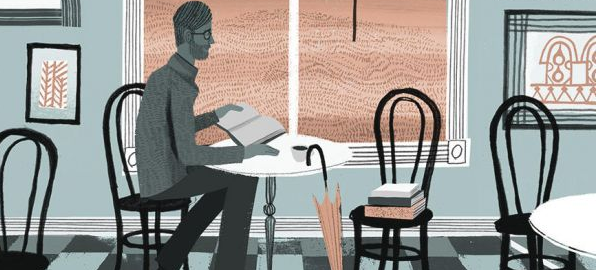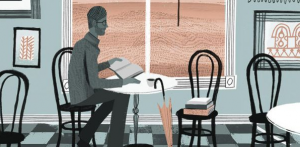By Scott Samuelson
This essay was originally published in The Chronicle of Higher Education. It is reposted here by permission.
In the spring of 2000, I was finishing my Ph.D. in philosophy at Emory University. The obvious path was to drift into a full-time position at a decent institution, work my dissertation into a book, zero in on a specialty, publish some articles and reviews, and lick the necessary wingtips to get tenure. But something kept me from taking such a path seriously.
Though I’d proved myself capable of publishing articles and giving papers in the world of academic philosophy, I rebelled against the prospect of a microspecialty and the bureaucracy of tenure. True, a comfy position at a liberal-arts college where I’d get to carve out a niche for myself on the Third Moment of the First Book of the First Division of Part One of Kant’s Third Critique was not without some attraction. But I felt that the pressure to publish the requisite number of articles and eke a book out of my dissertation wasn’t going to develop my mind or writing in a genuinely productive way.
What originally attracted me to philosophy was its life-and-death importance, how it deals with our burning questions in the most serious and comprehensive way. However wonderful and necessary the work of scholarship can be, I hadn’t gotten into philosophy to become a careerist.
But I needed money. The saying “a job is a job” is poignant for philosophers, particularly in an age of slashed positions and exploited adjuncts. Diogenes of Sinope, one of my profession’s early practitioners, used to beg money from statues. When asked why, he replied, “In order to get used to being refused.” But Diogenes didn’t have a pregnant wife, as I did. And I didn’t particularly want us to live in a barrel and relieve ourselves outside, as were Diogenes’ customs. When my mom called me from Iowa saying that she’d read in the local classifieds that Kirkwood Community College had a full-time philosophy position open, it seemed like a reasonable way to get health insurance.
The big choices in life tend to be poetic: They’re made on the basis of subterranean inspirations. It’s only much later that we become literary critics, so to speak, and try to explain what those choices mean. The decision to teach at a community college has proved to be an inspired one for reasons far beyond its benefits package.
One of the central questions of my discipline is “What is philosophy?” (In other words, even we’re not sure what we’re doing.) I’d like to ask a related question: “Where is philosophy?”
We tend to picture something beyond everyday life: a 1940s Parisian cafe, or an oak-tabled seminar room replete with professor and students in various states of dishevelment, or simply whatever transpires in the skulls of those rumpled types when they’re staring off into space. Those of us who happen to be gloriously pontificating in a seminar room or a Starbucks version of a postwar Parisian cafe are tempted to look down our noses at the world of everyday people like plumbers and harried moms.
In the Tusculan Disputations, Cicero famously says, “Socrates was the first to call philosophy down from the heavens and set her in our cities, bring her into our homes, and compel her to ask questions about life and morality and the nature of good and evil.”
At a community college, my students-aspiring plumbers and harried moms among them-helped me to rediscover that Socratic mission of grounding philosophy in the serious questions of ordinary people-that is, extraordinary people, like you and me.
I never fully understood Kant until a student of mine, a mother who had to authorize a risky surgery for her son that led to his death, asked me in tears if Kant was right that the consequences of an action play no role in its moral worth. I never fully understood Stoicism until a student of mine who’d been sexually abused as a child explained to me how she’d deduced the same principles as Epictetus to transcend her suffering and find happiness. John Locke always seemed a little boring to me until a Sudanese refugee asked me tremblingly if we could study his arguments for religious freedom.
Don’t get me wrong. Teaching at a community college isn’t always-or even often-a beautiful Socratic dialogue with engaged interlocutors. Many students regard my classes as pointless hoops to be jumped through so that more pointless hoops can be hurdled later, in the vague hope that such hoops will someday lead to a decent wage. Stanley Cavell once called philosophy “education for grown-ups.” Having taught a mix of college-age kids and “nontraditional” students, I often think that college is wasted on the young.
But I’ve learned not to underestimate anyone. An unremarkable college-age kid once wrote me a letter a few years after having taken my class. Ever since I’d quoted a line of Schopenhauer in a lecture, he’d been surreptitiously reading the German pessimist in search of it (he was too shy just to ask me). After making it through both volumes of The World as Will and Representation and a good chunk of Parerga and Paralipomena,he’d finally found the quotation. Enclosed with the grateful letter was a short story that he’d written on a Schopenhauerian theme. You just never know what’s going on in the mind of that slouching student in the back row.
I worry that philosophy-and the humanities more generally-is often taught to students as if the endgame were for them to become professionals in the discipline. We should be wary of what passes for philosophy but is really sophism. How are we going to mount a good defense of the humanities against crass economic logic when we teach our classes, particularly introductory classes, as if we were preparing students for academic jobs?
Sure, it’s important that we produce some well-trained scholars and thinkers. It’s even more crucial that we initiate students into strong forms of thinking, reading, and writing. But the reason we should support the humanities in a general education isn’t so students can produce slick essays; it’s so they can lead examined lives. Philosophy should be able to speak to a mom in tears.
Where is philosophy? I’m quite sure that the spirit of Socrates pays regular visits to community colleges. But I don’t want to snub our elite institutions. Who knows? It might be possible to find philosophy there, too.
 Scott Samuelson is an associate professor of philosophy at Kirkwood Community College. He is the author of The Deepest Human Life: An Introduction to Philosophy for Everyone (University of Chicago Press, 2014), from which part of this essay is adapted.
Scott Samuelson is an associate professor of philosophy at Kirkwood Community College. He is the author of The Deepest Human Life: An Introduction to Philosophy for Everyone (University of Chicago Press, 2014), from which part of this essay is adapted.


Great post, Scott. I see more attention being paid to the issues you raise here as colleges begin to attend more to the education of the “whole person” than the production of future academics. I wonder, though, if offering “defenses” of philosophy (or the humanities in general) by pointing to their more practical applications is the way to move forward on this front; it strikes me more than anything as a necessary corrective to professional philosophical practitioners than an appeal to the broader citizenry.
Hi Philosophy @ MHS,
This article is written by Scott Samuelson not me (Ashley Champagne). Sorry for the confusion!
Thanks,
Ashley